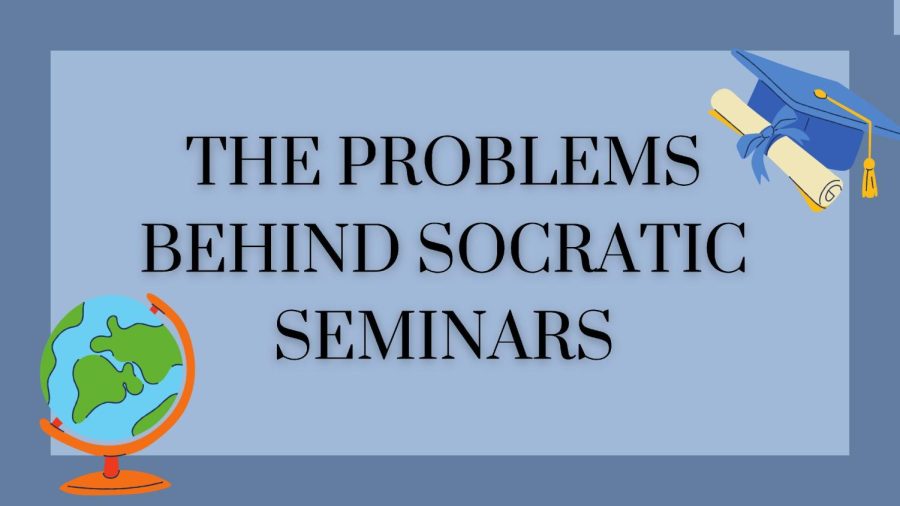Socratic Seminars: A discussion or a performance?
Socratic seminars are a staple in our English classes, but do they actually pose any benefit?
September 23, 2022
Socratic seminars are a staple part of the American Education System. Whether you love them or hate them, they are unavoidable and crucial to your English grade. However, the question still stands: What are Socratic seminars actually achieving?
For starters, let’s talk about what a Socratic seminar is and the ‘goal’ of performing one. A Socratic seminar is an activity held mostly in English classes that consists of students sitting in a circle discussing a topic. You are graded based on what you contribute to the conversation. Here at Green Level, you are graded on Evidence, Originality, Collaboration, and Universality. During the discussion, you must represent evidence, originality, and collaboration three times and universality twice. Your grade will reflect how many points you hit.
The main problem that comes with this grading scale is it causes very few people to actually care about the discussion. In most cases, the need for a hundred overpowers the goal of respectfully conversing about a topic. Most participants plan out responses in advance, knowing exactly what they will say that will win them the points. This call for perfection completely defeats the purpose of what is supposed to be a collaborative and spontaneous conversation. When Aanya Parekh, an 11th grader at Green Level currently taking AP Lang, was asked what she thinks student’s main focus is during Socratic seminars, she responded with, “Not many people care about the book [the topic of her most recent Socratic seminar] and what’s going on. They’re just making up points to get the grade.” Having a discussion be graded is going to take the focus off the conversation and place it upon the grade. While seminars do a wonderful job training kids how to read their pre-written quotes and spit up facts, it does not accurately prepare a person for the spontaneity aspect which is meant to be a foundation of most conversations. Instead, they lack emotion because the grading aspect drains any passion students have for the topic and gives participants a false perception that discussions are meant to be robotic and boring. To students, a Socratic seminar is less a discussion than it is a performance.
The idea that students care more about a grade than having a discussion fuels the fact that most students care more about speaking than listening to others. The entire time students are in the circle, they are focused on themselves. The combination of the need for a good grade, the short amount of given time, and the number of other students all trying to do exact same thing creates a state of anxiety that forces selfishness out of students. Emma Royall, a junior at Green Level who took English II last year, gave her input on the matter by stating, “Having to participate in Socratic seminars has been more of a stressor than a tool to showcase what I’ve learned.”
Most Socratic members aren’t really listening to what others are saying, but spend the time others are talking impatiently waiting for them to finish so they can jump right in and make their point. This need to talk creates a chaotic environment, as students are constantly talking over each other and competing for availability to make their claims. If students are listening to others, it is usually for the sole purpose of getting collaboration points, not because they actually care about what others have to say. It begs the question: What is this teaching students about how discussions should be held? Socratics are meant to teach students how to have a proper conversation. Instead, they show students how to be internally disrespectful toward their peers and installs the idea in our future generations that conversations are meant to be self-centered and redundant. Socratics cause students to mistake the term collaboration for fraternization, which makes it less of a discussion and more of a competition.
Lastly, one of the more unseen problems of Socratic seminars is how they either benefit or limit students based on differing personality types. To state the obvious, some students by nature are more outspoken whereas other students are more reserved. As mentioned earlier, a common occurrence of Socratic seminars is after someone finishes speaking, an abundance of students will immediately pounce in order to get their chance to talk. Kids who have more of a bold nature will clearly dominate a discussion where the accessibility to talk is mainly based on how fast you are to speak up and how loud you can be compared to the other kids attempting to share their input. If you observe a Socratic seminar, you will witness a constant recurrence of quieter kids being cut off by their more vocal classmates. This competitive atmosphere causes an inaccurate representation of someone’s knowledge of a subject. When asked what struggles she has faced in past Socratic seminars, Emma Royall responded, “It was so difficult to compete with the vocal kids that were naturally gifted at speaking and sharing their opinions, and I often got a lower grade than what I felt I deserved because I was less outgoing than some of the other students.” Socratic seminars are built upon an unfair foundation that allows some students to thrive and profit while other students stress and fall short regardless of actual knowledge or effort. It is unfortunate but true that Socratic seminars set up an environment that benefits some students over others because of things beyond their control.
While the basic concept of a Socratic seminar is positive, the way they are structured in a classroom has completely manipulated the initial objective for a discussion. The grading scale and pressure to do well leads to a competitive and performative environment, completely disregarding the point of having a genuine conversation. Socratics should be used as a learning tool to teach kids tips on how to be beneficial and pertinent in the future discussions they will inevitably participate in post-school. If anything, they should be graded on whether or not a student engages and adds something authentic and genuine. Instead, it sets up a bullseye and deducts points if you don’t have a perfect throw. However, no matter the problems Socratic seminars may pose, they are not going anywhere. They have been a part of the core curriculum for decades, and are going to continue for the rest of your educational career. So, while you don’t have to like them, you do have to adjust to them if you wish to succeed. Nevertheless, it is crucial that you don’t lose sight of the importance of collaboration. Don’t allow the schoolboard to manipulate your conception of conversation, and know you shouldn’t feel discouraged over whether or not you can meet robotic expectations.







